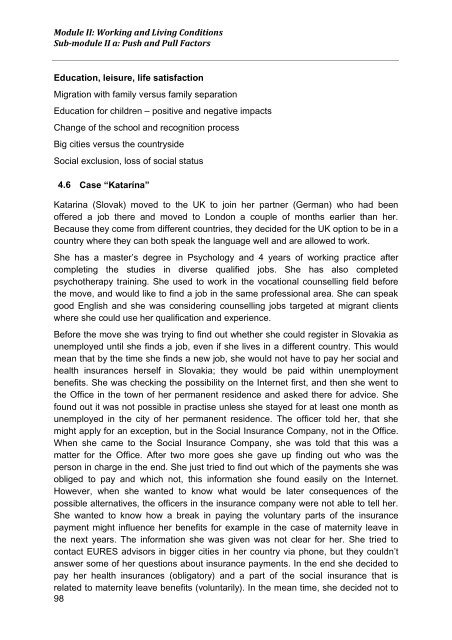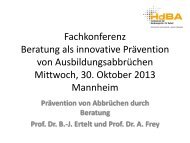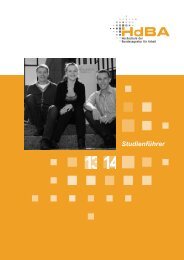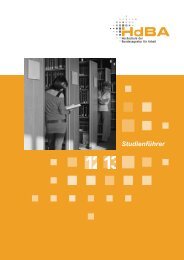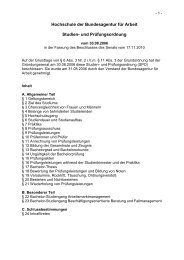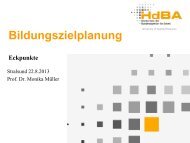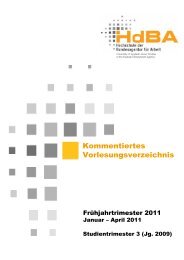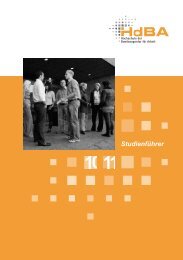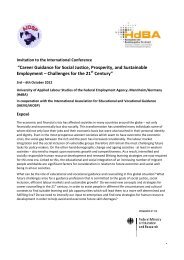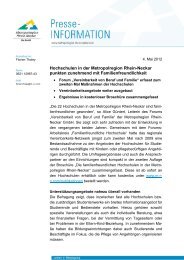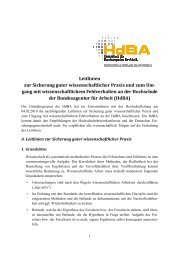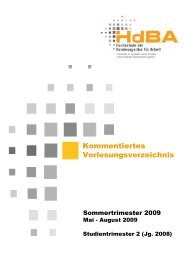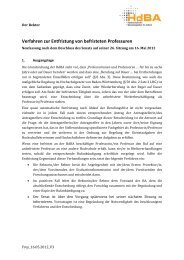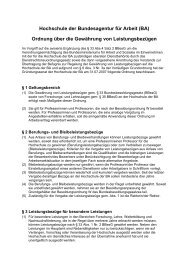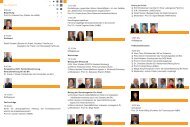Brain Drain - Hochschule der Bundesagentur für Arbeit
Brain Drain - Hochschule der Bundesagentur für Arbeit
Brain Drain - Hochschule der Bundesagentur für Arbeit
Create successful ePaper yourself
Turn your PDF publications into a flip-book with our unique Google optimized e-Paper software.
�����������������������������������������<br />
���������������������������������������<br />
�<br />
�<br />
Education, leisure, life satisfaction<br />
Migration with family versus family separation<br />
Education for children – positive and negative impacts<br />
Change of the school and recognition process<br />
Big cities versus the countryside<br />
Social exclusion, loss of social status<br />
4.6 Case “Katarína”<br />
Katarina (Slovak) moved to the UK to join her partner (German) who had been<br />
offered a job there and moved to London a couple of months earlier than her.<br />
Because they come from different countries, they decided for the UK option to be in a<br />
country where they can both speak the language well and are allowed to work.<br />
She has a master’s degree in Psychology and 4 years of working practice after<br />
completing the studies in diverse qualified jobs. She has also completed<br />
psychotherapy training. She used to work in the vocational counselling field before<br />
the move, and would like to find a job in the same professional area. She can speak<br />
good English and she was consi<strong>der</strong>ing counselling jobs targeted at migrant clients<br />
where she could use her qualification and experience.<br />
Before the move she was trying to find out whether she could register in Slovakia as<br />
unemployed until she finds a job, even if she lives in a different country. This would<br />
mean that by the time she finds a new job, she would not have to pay her social and<br />
health insurances herself in Slovakia; they would be paid within unemployment<br />
benefits. She was checking the possibility on the Internet first, and then she went to<br />
the Office in the town of her permanent residence and asked there for advice. She<br />
found out it was not possible in practise unless she stayed for at least one month as<br />
unemployed in the city of her permanent residence. The officer told her, that she<br />
might apply for an exception, but in the Social Insurance Company, not in the Office.<br />
When she came to the Social Insurance Company, she was told that this was a<br />
matter for the Office. After two more goes she gave up finding out who was the<br />
person in charge in the end. She just tried to find out which of the payments she was<br />
obliged to pay and which not, this information she found easily on the Internet.<br />
However, when she wanted to know what would be later consequences of the<br />
possible alternatives, the officers in the insurance company were not able to tell her.<br />
She wanted to know how a break in paying the voluntary parts of the insurance<br />
payment might influence her benefits for example in the case of maternity leave in<br />
the next years. The information she was given was not clear for her. She tried to<br />
contact EURES advisors in bigger cities in her country via phone, but they couldn’t<br />
answer some of her questions about insurance payments. In the end she decided to<br />
pay her health insurances (obligatory) and a part of the social insurance that is<br />
related to maternity leave benefits (voluntarily). In the mean time, she decided not to<br />
98


